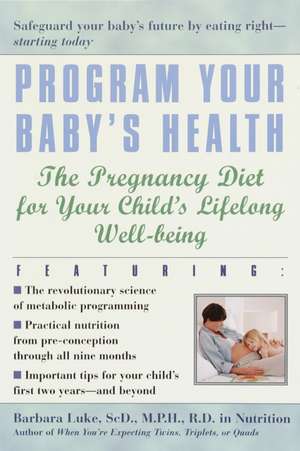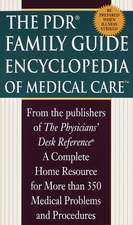Program Your Baby's Health: The Pregnancy Diet for Your Child's Lifelong Well-Being
Autor Barbara Luke, Tamara Eberleinen Limba Engleză Paperback – 31 mar 2001
Cutting edge research in a new field known as "metabolic programming" reveals a startling new fact: what a mother eats during pregnancy has a far greater effect on her child's future development, overall health, and resistance to disease than was previously thought. In fact, adult chronic illnesses long blamed on an unhealthy lifestyle or genetic influences are now believed to be a direct result of the uterine environment during pregnancy.
Now, thanks to this pioneering new book, you can "program" your baby's future health by eating right, gaining the appropriate amount of weight, and avoiding toxins--starting even before conceiving. Dr. Barbara Luke, a nationally recognized expert in the field of public-health nutrition, provides a complete, practical nutrition and lifestyle program that covers your entire pregnancy, month by month--and the first two years of your baby's life. Here is everything you need to know to raise the healthiest baby possible, including:
- What to eat when you're trying to conceive and when you are pregnant
- Practical strategies that protect your child against hypertension, diabetes, and obesity
- Special dietary needs for women in every age group, from under 25 to over 40
- Quick, easy menus, helpful charts, and checklists
- Replenishing fluids: how much do you need to drink?
- The nutritional needs of mothers carrying twins or "super-twins"
- New strategies for overcoming morning sickness
- Helping your growing child eat right and stay healthy
Pregnancy is your window of opportunity to boost your baby's health at birth, through childhood, and beyond. Let this book help you take the most advanced, scientific approach to preventing disease and optimizing health!
Preț: 142.38 lei
Nou
Puncte Express: 214
Preț estimativ în valută:
27.24€ • 28.44$ • 22.55£
27.24€ • 28.44$ • 22.55£
Carte disponibilă
Livrare economică 14-28 martie
Preluare comenzi: 021 569.72.76
Specificații
ISBN-13: 9780345441997
ISBN-10: 0345441990
Pagini: 432
Dimensiuni: 143 x 214 x 27 mm
Greutate: 0.57 kg
Editura: BALLANTINE BOOKS
ISBN-10: 0345441990
Pagini: 432
Dimensiuni: 143 x 214 x 27 mm
Greutate: 0.57 kg
Editura: BALLANTINE BOOKS
Extras
METABOLIC PROGRAMMING: THE NEW SCIENCE
Suppose a pregnant woman could take a pill that would program her unborn baby for a long and healthy life free of heart disease, hypertension, diabetes, cancer, asthma, allergies, and even obesity. Wouldn’t every mother-to-be in the country clamor for a prescription?
Well, that miracle pill doesn’t exist—but there is a prescription that can significantly boost your baby’s odds of being born healthy and staying healthy for many decades. It’s a prenatal regimen that lets an expectant mother “program” her unborn child for optimal growth, development, and resistance to disease from infancy through adulthood. Nearly all of the body’s cells, systems, and organs may be positively and permanently affected by this regimen.
The key to this program lies in the cutting-edge research now underway in the scientific field known as metabolic programming. Evidence reveals that adult illnesses that have long been blamed on genetic influences or an unhealthy lifestyle may instead be the result of the uterine environment. In other words, the nine short months of life in the womb may shape your baby’s health as long as he or she lives.
Prenatal nutrition is central to the health plan that can program your baby’s health and metabolism. This plan involves no improbable menus and no hard-to-find, health-food-store-only fare. Instead, it’s based on sound nutritional guidelines that incorporate real-people foods like pizza, cheeseburgers, chili, salads, and even ice cream into your diet. This is the plan I describe in Program Your Baby’s Health: The Pregnancy Diet for Your Child’s Lifelong Well-being.
As a medical school professor at the University of Michigan, public health nutritionist, epidemiologist, researcher, and mother myself, I am intimately familiar with both the science and the reality of maternal and pediatric nutrition. I have counseled thousands of pregnant women, and have helped generations of children to begin their lives healthy and strong.
For nearly three decades, metabolic programming has been the foundation of most of my research. It has also been the basis of my work as director of the University of Michigan Multiples Clinic, a highly successful program for women pregnant with twins, triplets, or quadruplets. At the clinic, we have designed a prenatal nutrition regimen that has resulted in hundreds of full-term, chubby-cheeked, healthy, beautiful babies. And this nutrition plan can do the same for your baby.
The Research Behind Metabolic Programming Twenty-eight years ago, as a graduate student in nutrition, I read a shocking study that changed my life and the course of my career. The study detailed the findings of one thousand autopsies of stillborn children and analyzed their mothers’ diets and weight gain during pregnancy1. It was a unique study because these babies had not died of any birth defect, but rather from complications during labor and delivery (tragedies that today are averted thanks to the routine use of electronic fetal monitoring). The study revealed that when mothers were undernourished, their babies’ organs were smaller and had fewer cells than normal. Many different organs were adversely affected: the heart and lungs, the liver and kidneys, the thymus, and even the brain.
I wondered, had these babies lived, how these smaller organs and cellular deficits would have affected the children’s health. Would the children have overcome the problems caused by these setbacks as they grew older, or would the ill effects have persisted throughout their lives? It seemed quite possible that inadequate lung development could lead to chronic asthma and respiratory problems; that an undersized liver might contribute to high cholesterol and cardiovascular disease in middle age; that poor growth of the kidneys could trigger hypertension; and that fewer thymus cells might translate into lifelong lowered immunity. These questions led a number of researchers, myself included, to examine the association between maternal nutrition and fetal, infant, and adult health.
Like pieces in a complicated puzzle, the answers to these questions nearly three decades ago have been put into place. All of the above concerns have proved to be valid: Smaller organs with fewer cells do set the stage for poor health later in life. Cellular deficits and other more subtle changes in the body’s structure and function caused by inadequate prenatal nutrition support the concept that many chronic diseases—including cardiovascular disease, hypertension, and diabetes—may originate before birth.
The name for this new field of science has evolved as the body of research has grown. Originally referred to as the Barker hypothesis, then as the fetal origins theory, it is now known as metabolic programming. While this term is often used to describe the relationship between a poor uterine environment and long-term health problems, metabolic programming also includes a positive side: An optimal uterine environment can help to promote life-long good health. I refer to this beneficial side of metabolic programming as positive programming.
EVIDENCE FROM AROUND THE WORLD Evidence for the concept of metabolic programming comes from a variety of studies from across the globe. For instance:
• David Barker, a British epidemiologist, was one of the first researchers to provide direct evidence that certain adult-onset diseases could originate from growth retardation before birth2. His research team reported an important association between the risk of hypertension in adulthood and having been born weighing less than 51?2 pounds.
• Further evidence for programming of adult hypertension in the womb was provided by the British National Study of Children3. Based on analysis of 5,362 individuals born in the United Kingdom in 1946 and followed to ages 43 or 44, this study demonstrated that adult blood pressure was significantly increased among individuals with low birthweight.
• The Dutch famine studies (based on the food blockage of the western Netherlands during World War II from October 1944 to May 1945) showed that women who were malnourished before they became pregnant experienced decreased fertility. Among children born to women who did get pregnant, there was an increase in birth defects of the spine and central nervous system, as well as an increase in mental illness in adulthood4.
• The timing of the Dutch famine in relation to pregnancy was important, too. Women who were malnourished during the first two trimesters of their pregnancies had more premature births and more stillborn births, and their children experienced more obesity as adults5. Children born to women who were undernourished during the third trimester of pregnancy subsequently experienced less obesity as adults, but the girl babies who ultimately had children of their own were more likely to give birth to low-birthweight infants.
• Studies of pregnant women with diabetes indicate that episodes of starvation, even for short periods of time, can also have a negative effect on an unborn baby’s developing nervous system. These children demonstrate lower IQ levels through nine years of age.
THE GOOD NEWS I know that all of this can sound very scary. But please remember that there is a very positive side to metabolic programming: Just as poor nutrition during pregnancy can lead to long-term health problems for a child, optimal nutrition in pregnancy helps to reduce the risk of chronic disease and sets the stage for a child’s long-term well-being. By eating right when you’re expecting, you can significantly boost your baby’s chances of enjoying excellent lifelong health. It’s that simple.
Still skeptical? Let me explain more about how researchers have come to this conclusion. When investigating a disease, scientific researchers first hint of its cause often comes from public health (or epidemiologic) studies. These studies look at clusters of cases that are linked to lifestyle or environmental factors. Recent examples include the connection between toxic shock syndrome and the use of Rely brand tampons, Legionnaires’ disease and air-conditioning systems, and Kaposi’s sarcoma and HIV. In investigating the causes of other medical conditions, scientists examine cellular, molecular, or genetic factors, and analyze how these may change in response to specific conditions.
Based on the strength of the research from hundreds of epidemiologic studies from around the world and combined with dramatic clinical evidence at the cellular level, the concept of metabolic programming has now become accepted as fact by scientists, researchers, and other health professionals in many fields. This accumulation of evidence for the validity of metabolic programming is one of the most exciting breakthroughs in the twentieth century, and is the basis for a highly effective new approach to the prevention of chronic disease in the twenty-first century.
Metabolic programming research provides powerful, compelling evidence that good nutrition before birth positively affects your baby’s health. And these benefits endure not only through infancy and childhood, but throughout life, by permanently reducing your child’s susceptibility to a variety of chronic diseases.
Why Growth Before Birth Is So Important I tell my patients that pregnancy has a lot in common with gardening. You can’t just throw seeds into soil, neglect to feed or water them, and still expect blue-ribbon roses. You have to nurture and nourish your potential showstoppers. So it’s only logical that nutrition plays a major role in pregnancy as well, and that certain nutrients, or lack of them, at critical periods of development will have lasting significance. Your personal commitment to optimal nutrition will boost your baby’s chances of lifelong well-being.
THE CRITICAL PERIOD A critical period is when the cells of any developing organ or system are particularly sensitive to the environment inside the womb, and can be positively affected by certain nutrients. For instance, it’s especially important for the mother to have enough folic acid in her diet immediately before and after conception (a critical period known as periconception) in order to ensure the baby’s healthy spinal development. If folic acid is lacking during this period, the neural tube does not form properly and the baby will be born with spina bifida (an opening in the spine).
Development of other systems is similarly susceptible to the timing of nutrients delivered to the unborn baby via the mother’s diet, particularly during periods of rapid growth and cell replication. During the first two months after conception (the embryonic period), the cells differentiate into the distinct organs and systems. From three months’ gestation until birth (the fetal period) is the time of highest growth rate, when cells are multiplying. So the long-term positive programming effects of optimal nutrition and lifestyle behaviors (and the long-term negative programming effects of poor nutrition and other environmental factors) depend on the stage of pregnancy at which they occur.
Suppose a pregnant woman could take a pill that would program her unborn baby for a long and healthy life free of heart disease, hypertension, diabetes, cancer, asthma, allergies, and even obesity. Wouldn’t every mother-to-be in the country clamor for a prescription?
Well, that miracle pill doesn’t exist—but there is a prescription that can significantly boost your baby’s odds of being born healthy and staying healthy for many decades. It’s a prenatal regimen that lets an expectant mother “program” her unborn child for optimal growth, development, and resistance to disease from infancy through adulthood. Nearly all of the body’s cells, systems, and organs may be positively and permanently affected by this regimen.
The key to this program lies in the cutting-edge research now underway in the scientific field known as metabolic programming. Evidence reveals that adult illnesses that have long been blamed on genetic influences or an unhealthy lifestyle may instead be the result of the uterine environment. In other words, the nine short months of life in the womb may shape your baby’s health as long as he or she lives.
Prenatal nutrition is central to the health plan that can program your baby’s health and metabolism. This plan involves no improbable menus and no hard-to-find, health-food-store-only fare. Instead, it’s based on sound nutritional guidelines that incorporate real-people foods like pizza, cheeseburgers, chili, salads, and even ice cream into your diet. This is the plan I describe in Program Your Baby’s Health: The Pregnancy Diet for Your Child’s Lifelong Well-being.
As a medical school professor at the University of Michigan, public health nutritionist, epidemiologist, researcher, and mother myself, I am intimately familiar with both the science and the reality of maternal and pediatric nutrition. I have counseled thousands of pregnant women, and have helped generations of children to begin their lives healthy and strong.
For nearly three decades, metabolic programming has been the foundation of most of my research. It has also been the basis of my work as director of the University of Michigan Multiples Clinic, a highly successful program for women pregnant with twins, triplets, or quadruplets. At the clinic, we have designed a prenatal nutrition regimen that has resulted in hundreds of full-term, chubby-cheeked, healthy, beautiful babies. And this nutrition plan can do the same for your baby.
The Research Behind Metabolic Programming Twenty-eight years ago, as a graduate student in nutrition, I read a shocking study that changed my life and the course of my career. The study detailed the findings of one thousand autopsies of stillborn children and analyzed their mothers’ diets and weight gain during pregnancy1. It was a unique study because these babies had not died of any birth defect, but rather from complications during labor and delivery (tragedies that today are averted thanks to the routine use of electronic fetal monitoring). The study revealed that when mothers were undernourished, their babies’ organs were smaller and had fewer cells than normal. Many different organs were adversely affected: the heart and lungs, the liver and kidneys, the thymus, and even the brain.
I wondered, had these babies lived, how these smaller organs and cellular deficits would have affected the children’s health. Would the children have overcome the problems caused by these setbacks as they grew older, or would the ill effects have persisted throughout their lives? It seemed quite possible that inadequate lung development could lead to chronic asthma and respiratory problems; that an undersized liver might contribute to high cholesterol and cardiovascular disease in middle age; that poor growth of the kidneys could trigger hypertension; and that fewer thymus cells might translate into lifelong lowered immunity. These questions led a number of researchers, myself included, to examine the association between maternal nutrition and fetal, infant, and adult health.
Like pieces in a complicated puzzle, the answers to these questions nearly three decades ago have been put into place. All of the above concerns have proved to be valid: Smaller organs with fewer cells do set the stage for poor health later in life. Cellular deficits and other more subtle changes in the body’s structure and function caused by inadequate prenatal nutrition support the concept that many chronic diseases—including cardiovascular disease, hypertension, and diabetes—may originate before birth.
The name for this new field of science has evolved as the body of research has grown. Originally referred to as the Barker hypothesis, then as the fetal origins theory, it is now known as metabolic programming. While this term is often used to describe the relationship between a poor uterine environment and long-term health problems, metabolic programming also includes a positive side: An optimal uterine environment can help to promote life-long good health. I refer to this beneficial side of metabolic programming as positive programming.
EVIDENCE FROM AROUND THE WORLD Evidence for the concept of metabolic programming comes from a variety of studies from across the globe. For instance:
• David Barker, a British epidemiologist, was one of the first researchers to provide direct evidence that certain adult-onset diseases could originate from growth retardation before birth2. His research team reported an important association between the risk of hypertension in adulthood and having been born weighing less than 51?2 pounds.
• Further evidence for programming of adult hypertension in the womb was provided by the British National Study of Children3. Based on analysis of 5,362 individuals born in the United Kingdom in 1946 and followed to ages 43 or 44, this study demonstrated that adult blood pressure was significantly increased among individuals with low birthweight.
• The Dutch famine studies (based on the food blockage of the western Netherlands during World War II from October 1944 to May 1945) showed that women who were malnourished before they became pregnant experienced decreased fertility. Among children born to women who did get pregnant, there was an increase in birth defects of the spine and central nervous system, as well as an increase in mental illness in adulthood4.
• The timing of the Dutch famine in relation to pregnancy was important, too. Women who were malnourished during the first two trimesters of their pregnancies had more premature births and more stillborn births, and their children experienced more obesity as adults5. Children born to women who were undernourished during the third trimester of pregnancy subsequently experienced less obesity as adults, but the girl babies who ultimately had children of their own were more likely to give birth to low-birthweight infants.
• Studies of pregnant women with diabetes indicate that episodes of starvation, even for short periods of time, can also have a negative effect on an unborn baby’s developing nervous system. These children demonstrate lower IQ levels through nine years of age.
THE GOOD NEWS I know that all of this can sound very scary. But please remember that there is a very positive side to metabolic programming: Just as poor nutrition during pregnancy can lead to long-term health problems for a child, optimal nutrition in pregnancy helps to reduce the risk of chronic disease and sets the stage for a child’s long-term well-being. By eating right when you’re expecting, you can significantly boost your baby’s chances of enjoying excellent lifelong health. It’s that simple.
Still skeptical? Let me explain more about how researchers have come to this conclusion. When investigating a disease, scientific researchers first hint of its cause often comes from public health (or epidemiologic) studies. These studies look at clusters of cases that are linked to lifestyle or environmental factors. Recent examples include the connection between toxic shock syndrome and the use of Rely brand tampons, Legionnaires’ disease and air-conditioning systems, and Kaposi’s sarcoma and HIV. In investigating the causes of other medical conditions, scientists examine cellular, molecular, or genetic factors, and analyze how these may change in response to specific conditions.
Based on the strength of the research from hundreds of epidemiologic studies from around the world and combined with dramatic clinical evidence at the cellular level, the concept of metabolic programming has now become accepted as fact by scientists, researchers, and other health professionals in many fields. This accumulation of evidence for the validity of metabolic programming is one of the most exciting breakthroughs in the twentieth century, and is the basis for a highly effective new approach to the prevention of chronic disease in the twenty-first century.
Metabolic programming research provides powerful, compelling evidence that good nutrition before birth positively affects your baby’s health. And these benefits endure not only through infancy and childhood, but throughout life, by permanently reducing your child’s susceptibility to a variety of chronic diseases.
Why Growth Before Birth Is So Important I tell my patients that pregnancy has a lot in common with gardening. You can’t just throw seeds into soil, neglect to feed or water them, and still expect blue-ribbon roses. You have to nurture and nourish your potential showstoppers. So it’s only logical that nutrition plays a major role in pregnancy as well, and that certain nutrients, or lack of them, at critical periods of development will have lasting significance. Your personal commitment to optimal nutrition will boost your baby’s chances of lifelong well-being.
THE CRITICAL PERIOD A critical period is when the cells of any developing organ or system are particularly sensitive to the environment inside the womb, and can be positively affected by certain nutrients. For instance, it’s especially important for the mother to have enough folic acid in her diet immediately before and after conception (a critical period known as periconception) in order to ensure the baby’s healthy spinal development. If folic acid is lacking during this period, the neural tube does not form properly and the baby will be born with spina bifida (an opening in the spine).
Development of other systems is similarly susceptible to the timing of nutrients delivered to the unborn baby via the mother’s diet, particularly during periods of rapid growth and cell replication. During the first two months after conception (the embryonic period), the cells differentiate into the distinct organs and systems. From three months’ gestation until birth (the fetal period) is the time of highest growth rate, when cells are multiplying. So the long-term positive programming effects of optimal nutrition and lifestyle behaviors (and the long-term negative programming effects of poor nutrition and other environmental factors) depend on the stage of pregnancy at which they occur.
Descriere
In this pioneering new book, women can "program" their baby's future health by eating right, gaining the appropriate amount of weight, and avoiding toxins--starting even before conception. Dr. Luke, a recognized expert in public health nutrition, provides a complete, practical nutrition and lifestyle program that covers the entire pregnancy, month by month--and the first two years of a baby's life.
Notă biografică
Barbara Luke, ScD., M.P.H., R.D., and Tamara Eberlein



















